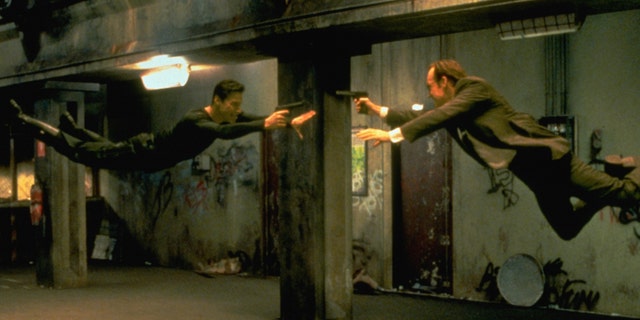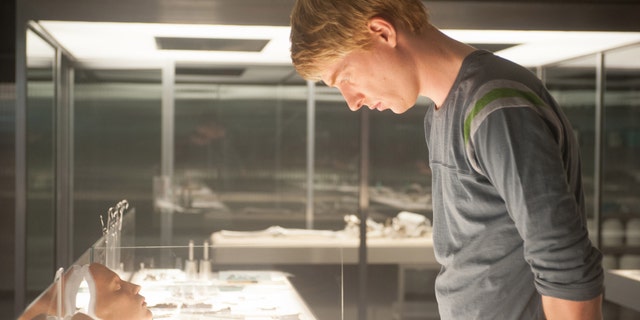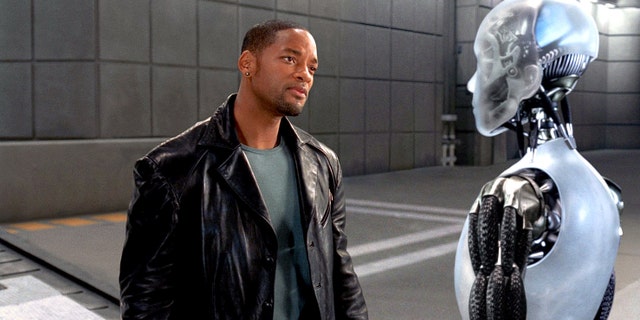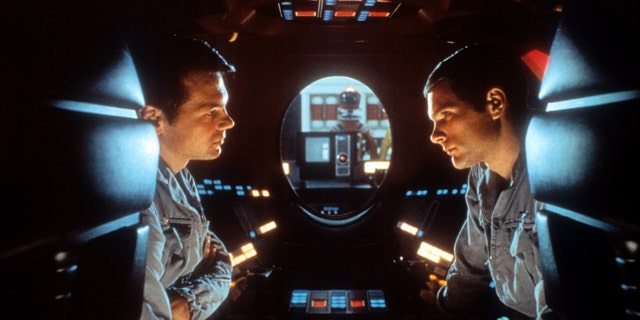While watching a film, viewers might ponder its legitimacy, questioning if what they’re seeing on screen can happen in real life.
Artificial intelligence is no different. AI is being heavily developed and utilized now to edit and amplify films, but the depths of its use has also been explored in futuristic, science-fiction movies like “The Matrix” or “I, Robot.”
With the rise of AI platforms, including ChatGPT, AI appears to be infiltrating every industry.
What once seemed inconceivable ideas, like a man falling in love with a digital assistant in the film “Her,” is something AI experts say is not only plausible but already happening.
In the movie “Her,” Joaquin Phoenix enters into a relationship with his digital assistant played by Scarlett Johansson. (©Warner Bros. Pictures/courtesy Everett Collection)
Here’s a look at five movies that involve artificial intelligence. Experts weigh in on whether they think what viewers see on screen could become a reality.
‘Her’
Siri and Alexa are just two examples of digital assistants who have found their way into modern culture. Imagine if users were able to establish a relationship with one of them?
“Her,” a movie released in 2013, follows Joaquin Phoenix as Theodore Twombly, a man suffering from heartbreak after ending a long relationship. Twombly becomes entranced by an advanced operating system known as “Samantha” (Scarlett Johansson).
“As her needs and desires grow, in tandem with his own, their friendship deepens into an eventual love for each other,” the description for the film says.
Gary Marcus, New York University professor, founder and CEO of Geometric Intelligence and host of the podcast “Humans versus Machines,” says “Her” is one of his favorite AI flicks.
“I think that the world that it describes is possible; already humans are becoming attached to some AI systems, and I think that the movie is right to forecast that this could lead to a dark world and to raise the question of whether that’s where we want to go,” Marcus told Fox News Digital.
“On a technical side, Samantha has a far greater (though imperfect) grasp of human nature, and what cognitive psychologists call ‘theory of mind,’ than any current technology. Current AI does a fine job of regurgitating human text, but a weaker, and fairly unreliable, job at understanding what makes humans tick.”

Joaquin Phoenix and Scarlett Johansson star in the 2013 film “Her.” (Alessandra Benedetti/Corbis)
Sean King, senior vice president of commercial enterprise at AI company Veritone, agrees the movie could happen in real life.
“Machines already know a lot about us. They know our buying patterns,” King said. “They know what we like and now. We can talk to these machines in a much more conversational way than ever before. People seek interactions and connections, and I can definitely see the potential for someone forming a relationship with AI in the way this movie depicts.”
‘The Matrix’

Keanu Reeves as Neo battles a computerized agent, Hugo Weaving’s Agent Smith, in “The Matrix.” (Ronald Siemoneit/Sygma)
Many are familiar with the 1999 movie “The Matrix.”
“Have you ever had a dream that you were so sure was real? What if you couldn’t awaken? How would you know the difference between dream and reality?” the description of the film asks.
The movie follows Carrie Ann Moss as Trinity, a stranger who shows computer hacker Neo (Keanu Reeves) “a forbidding underworld” where he discovers “the life he knows is the elaborate deception of an evil cyber-intelligence. Neo joins legendary and dangerous rebel warrior Morpheus (Laurence Fishburne) in the battle to destroy the illusion enslaving humanity,” according to its synopsis.
Marcus is wary of this movie plot becoming reality, saying humans are not likely to be “swallowed into the matrix.”
“What might happen though is that people spend more and more time immersed in virtual reality, aware that they are doing so but relatively uninterested in leaving VR for actual reality,” Marcus added.
KEANU REEVES REVEALS WHY HE RETURNED TO ‘THE MATRIX’ FRANCHISE: IT ‘RESONATED WITH ME’
King agrees, anticipating the growing interest in today’s metaverse. A metaverse is described by Merriam-Webster’s dictionary as being “a persistent virtual environment that allows access to and interoperability of multiple individual virtual realities.”
“We’re seeing people communicate remotely in digitally immersive environments,” King says. “Now, are we going to become batteries for machines? No. But are people doing things together in a digital world? Yes. They’re doing that today.”

One AI expert believes that the technological deception we see in the 2015 movie “Ex Machina” could only happen if the software is specifically trained to be deceptive. (©A24/Courtesy Everett Collection)
‘Ex Machina’
Similar to “Her,” the 2015 movie “Ex Machina” shows viewers an emotionally advanced, artificially generated system, but this time in robot form. A programmer named Caleb (Domhnall Gleeson) gets the chance to spend a week with tech CEO Nathan Bateman (Oscar Isaac). He learns that he’ll be “the human component in a Turing Test — charging him with evaluating the capabilities, and ultimately the consciousness, of Nathan’s latest experiment in artificial intelligence.”
“That experiment is Ava, (Alicia Vikander), a breathtaking AI whose emotional intelligence proves more sophisticated — and more deceptive — than the two men could have imagined,” the synopsis says.
Marcus is hopeful that an emotionally intelligent creation such as Ava could not become a reality.
“I certainly hope that we will not create self-aware AI that ponders its own existence; we’ve already opened one or two Pandora boxes too many,” he joked to Fox News Digital. “But making AI that can deceive humans into thinking it is human is no longer far away and, indeed, arguably here, at least for short conversations.”
“We’re certainly seeing AI pass bar exams and other tests,” King said. “So, it’s clear that AI can be trained to do some impressive things. But will AI become purposely deceptive? Perhaps, but someone would have to purposely train it to do so.”
‘I, Robot’
Following the robot theme, the 2004 picture “I, Robot” takes a look at how robots could potentially outsmart humankind. Will Smith plays Del Spooner, investigating the reported suicide of a robot designer. He teams up with “a robo-psychologist and a prototype robot with human emotions to thwart a worldwide robot revolution designed to overthrow human rule,” the description explains.
The movie also stars Bridget Moynahan, Alan Tudyk and James Cromwell, among others.
King questions if artificial intelligence can police and protect humans as “I, Robot” explores or take over mankind.
“Will artificial intelligence help us keep humanity safe? Absolutely,” he said. “Artificial intelligence brings more transparency to the world and, if used effectively, it can improve public safety. But are robots going to take over the world and enslave us? No. Not in my lifetime.”
Marcus, who chose to comment on the book by Isaac Asimov, which inspired the film, says he doesn’t believe robots will be taking over.

Will Smith starred in the 2004 film “I, Robot.” (20th Century Fox Film Corp.)
CLICK HERE TO SIGN UP FOR THE ENTERTAINMENT NEWSLETTER
“I rather doubt that robots will try to enslave the human race, but Asimov’s Law of Robotics (e.g., do no harm to humans) remains an important touchstone: How can we build AI systems that honor human values. Sadly, we don’t yet have an answer.”
‘2001: A Space Odyssey’
Don’t be deceived by its name, “2001: A Space Odyssey” was filmed in 1968.
The synopsis of the movie describes a “Stone Age Earth: In the presence of a mysterious black obelisk, pre-humans discover the use of tools — and weapons — violently taking first steps toward intelligence. 1999: On Earth’s moon astronauts uncover another mysterious black obelisk. 2001: Between Earth and Jupiter, the spacecraft’s intelligent computer makes a mistake that kills most of the human crew, then continues to kill to hide its error. Beyond Time: The sole survivor of the journey to Jupiter ascends to the next level of humanity.”
Douglas Rain portrays HAL 9000, a computer with human-like behavior.
Marcus called the movie an “amazing and haunting film,” noting it has recently been parodied.
King says the film was the first of its kind to show the relationship between humans and technology.

Gary Lockwood and Keir Dullea star in “2001: A Space Odyssey.” (Metro-Goldwyn-Mayer)
CLICK HERE TO GET THE FOX NEWS APP
“HAL was the first iteration in film of man and machine talking to each other and that exists today. People are talking to machines in the forms of chatbots and other large language models. Now, is it going to lead to showdowns between man and machine? No, we’re not seeing that,” King said.